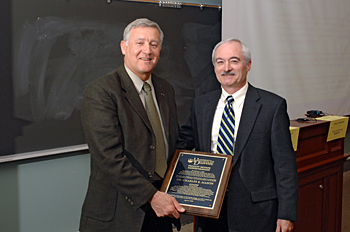
The new majors are in Black American Studies and mathematics education, both within the College of Arts and Sciences. Black American Studies, which has been a successful minor since 1972, has existing core and joint faculty and sufficient courses to offer a 31-credit major. The new major in mathematics education is intended for students who may want to pursue graduate study in mathematics after teaching in high schools for several years.
New bachelor of science degrees in quantitative biology and psychology also were approved by the senate. A bachelor of science degree in cognitive science and a B.S. degree with honors in cognitive science were added within the Department of Linguistics.
Earlier in the meeting, a Faculty Senate Commendation was presented to Charles E. Mason, professor of entomology and wildlife ecology, for his extraordinary leadership and service to the senate. The commendation cites his service as senator, vice president, parliamentarian, chairman of the graduate studies committee for three years and membership on five other senate committees.
A guide for faculty and academic units on discovery-based and experiential learning now being prepared by the General Education Committee of the senate was introduced by Sen. Avon Abraham. The guide answers frequently asked questions and includes the final products expected from students involved in discovery learning, which range from research papers to portfolios to oral or media presentations.
Twenty recommended academic changes from the undergraduate and graduate committees were passed by the senate without challenge. One recommendation--to reduce the arts and sciences breadth requirements for a B.A. from 16 courses to 12--was carried over to the regular agenda for further discussion.
According to the announcements for challenge agenda, the Committee on Undergraduate Studies requested a reduction of the A&S breadth requirements for a three-year provisional period to give students more flexibility to develop or discover interests and talents outside their major.
Seeking the committee's rationale for the change, senators learned that by reducing the required courses from four to three in each of the four A&S breadth requirements, students could take advantage of the opportunity to pursue double majors and minors, as well as participate more fully in discovery-based learning experiences.
“It is difficult to have a double major or multiple minors and still participate in discovery learning,” Tom Apple, dean of the College of Arts and Sciences, said. The change in breadth requirements is expected to reverse that situation and open up additional learning options.
The recommendation passed with two nay votes.
Article by Cornelia Weil
Photo by Kathy Atkinison


